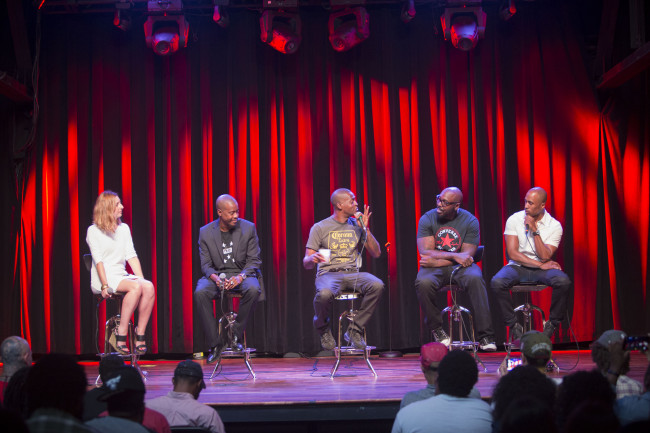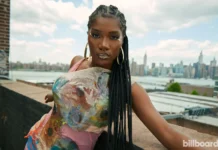

NPR Music’s Microphone Check is the information hub’s premier podcast for conversing about Hip-Hop culture. The show features hosts Frannie Kelley and Ali Shaheed Muhammad sitting with recording artists, producers, managers, executives, scholars and attorneys to have what essentially is a meeting of the minds.
They might chat about laws, the creative process, history or new releases. The dialogue is sometimes funny but always informative, unfiltered, nostalgic and quite interesting.
Kelley and Muhammad recently visited Atlanta to record a live interview with songwriters and producers Rico Wade, Patrick “Sleepy” Brown and Ray Murray, collectively known as Organized Noize. Kelley, also editor-in-chief of the music media company, Yours Truly, was excited that Microphone Check was stopping in music meccas across America.
She believes touring allows Microphone Check to further brand itself as an online destination that takes black cultural production seriously. “To be perfectly honest, it’s really about being in the studio,” says Kelley, “just the three or four of us, and it ends up being us listening to each other.”
“We’re demonstrating a lot of things to a lot of people,” adds Kelley. “There’s a really engaged audience around Hip-Hop culture. They don’t have to be scared. It’s people talking to each other about popular music.”
The concept for Microphone Check came from Kelley receiving an email from one of her readers around 2010. The reader noted that Muhammad, a member of both legendary hip hop trio, A Tribe Called Quest, and supergroup, Lucy Pearl, found an article she edited as problematic as he did.
The lackluster piece’s subject matter contained reprinted poorly transcribed lyrics. Kelley had no choice but to own up to her editorial faux pas. “Someone had reread a rap anthology without having listened to the songs,” recalls Kelley. “I wrote back and said, ‘Yes, I fucked up.’” That erroneous moment prompted Kelley, who joined NPR in 2007, to invite Muhammad in to possibly talk partnership.
They came up with Microphone Check around 2012, a program Kelley says could “talk about pop music for real and stop explaining it to people.” The program’s subject matter comes off equally as personable as it is informative. “We thought this was the best way,” says Kelley, who studied music criticism at NYU, shortly before an extremely cordial Muhammad arrived. “I’d rather talk to a lot of different people about it.”
Organized Noize’s town hall-style taping at Terminal West was nothing short of nuggets of wisdom, down home jokes and recollections about what it took to craft their musical sound and become instrumental in the process in shaping the city’s musical identity. The trio who also spearheaded the hip hop syndicate, the Dungeon Family, reflected on their two-decade career penning and producing hit singles for Outkast, TLC, Goodie, Mob, Brandy, Ludacris, Curtis Mayfield and En Vogue.
Their conversation had its share of surprises. Murray had to make an early exit, so Dungeon Family’s resident spoken word artist, Ruben “Big Rube” Bailey, stepped in. Big Boi, one half of groundbreaking Grammy-winning duo, Outkast, made a few comments from the audience. Wade, Brown and Murray each talked about how they met each other, dealt with success and their relationships with record label executives and even shared details about their upcoming documentary chronicling their story.
Muhammad and Kelley both agree that Microphone Check’s sole purpose is to have genuine talks about music and culture with the people who make it happen. For Kelley though, the greatest reward for being on Microphone Check for three years now is sitting next to Muhammad.
The Grammy-nominated producer, musician, songwriter and former A&R executive, she says, helped her to overcome her nervousness and take her appreciation for Hip-Hop and journalism more seriously.
“[Ali Shaheed] is a completely legendary human being,” proclaims Kelley. What he’s given me is a way to do the real work that I love to do. I’m the luckiest girl in the world.”
This post was written by Christopher A. Daniel, pop cultural critic and music editor for the Burton Wire. He is also contributing writer for Urban Lux Magazine and Blues & Soul Magazine. Follow Christopher @Journalistorian on Twitter.
Follow the Burton Wire on Twitter @TheBurtonWire or Instagram.







